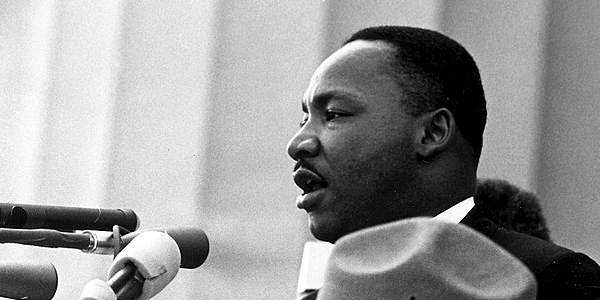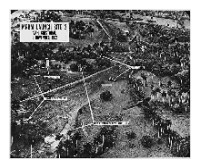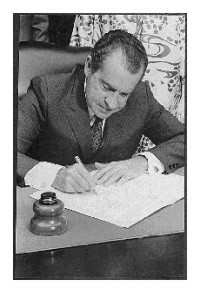Sponsor this page. Your banner or text ad can fill the space above.
Click here to Sponsor the page and how to reserve your ad.
-
Timeline
1963 - Detail
August 28, 1963 - The Civil Rights march on Washington, D.C. for Jobs and Freedom culminates with Dr. Martin Luther King's famous "I Have a Dream" speech from the steps of the Lincoln Memorial. Over 200,000 people participated in the march for equal rights.

It has become one of the most landmark speeches in the annals of American history, perhaps the most important speech since its inspiration, the words by the man whose statue stood behind the leaders of the march that day, Abraham Lincoln and his Gettysburg address. The Civil Rights march was known at the time as the March on Washington for Jobs and Freedom, although today the first part of that title "for Jobs" has become somewhat lost to history. It was, and still is, the rallying cry for Civil Rights, the promise that all men shall and will be created equal, as we strive for the goals that Martin Luther King, Jr. stated that day.
The march was organized by Civil Rights leaders, A. Philip Randolph and Bayard Rustin. Randolph had been involved in the cause of black workers rights since 1925 when he organized the first black employees union, the Brotherhood of Sleeping Car Porters. His works had led to the banning of segregation for workers during World War II as well as the ban on segregation in the Armed forces in 1948. Rustin had been a pacifist activist in the Civil Rights movement for decades, organizing the Freedom Ride against segregation in interstate busing in 1947.
The Civil Rights movement had been gaining momentum throughout the 1950's (a small event had been held at the Lincoln Memorial on May 17, 1957, that also involved Martin Luther King), with the 100th anniversary of the Emancipation Proclamation serving as a rationale for a larger rally and march on Washington. Plans for the march began in late 1961 between Randolph and Rustin, focusing on the issue of jobs. It expanded to include Freedom as additional groups joined, but also included an aspect of civil disobedience which some leaders thought important in order to make their points. On June 22, 1963, organizers met with President Kennedy. A compromise was reached that ruled out civil disobedience in exchange for a march, speeches, and peaceful assembly, which the President endorsed.
The rally would be inclusive, both black and whites would march together. It is estimated that sixty thousand white citizens were in the crowd of up to two hundred and fifty thousand. By August 28, four hundred and fifty buses had left New York City; the United Auto Workers paid for transportation of five thousand of its workers; six buses left Birmingham, Alabama. All told, more than two thousand buses, ten chartered planes, as well as regularly scheduled tranportation, and a multitude of private cars converged on the city. There were discussions around the nation on whether the event would turn violent. It did not. The Pentagon had nineteen thousand troops ready if it did.
The march began at the Washington Monument and proceeded to the Lincoln Memorial. There were ten main speakers once the ceremomies began on the steps of the Memorial. The last of the main speakers was Martin Luther King. His words rang over the several hundred thousand gathered on the National Mall, as well as a nationwide national television audience. The "I Have a Dream Speech" resounded through the nation, gaining importance and resonance as the day, year, and decades passed. Today, a National Park Service marker indicates the location of the rostrum. A towering statue of Martin Luther King has taken its place in West Potomac Park of Washington, D.C., just off the National Mall, to commemorate the man whose words that day inspired a nation to act on the issues of Freedom and Equality through legislation such as the Civil Rights Acts of 1964 and the Voting Rights Act of 1965, but still has troublesome remnants to this day.

50th Anniversary Celebration
The 50th Anniversary of the Civil Rights March on Washington for Jobs and Freedom was held on August 28, 2013. It was attended by nearly one hundred thousand people, as well as President Obama, President Clinton, and other dignitaries. President Obama awarded the Presidential Medal of Freedom to Bernard Rustin. Representative John Lewis, the only living member of those who spoke in 1963, also spoke. The Post Office issued a stamp on the 50th anniversary honoring the 1963 March for Jobs and Freedom.

Full Text, I Have a Dream Speech, August 28, 1963
Speech by the Rev. MARTIN LuTHER KING At the "March on Washington"
I am happy to join with you today in what will go down in history as the greatest demonstration for freedom in the history of our nation.
Five score years ago a great American in whose symbolic shadow we stand today signed the Emancipation Proclamation. This momentous decree is a great beacon light of hope to millions of Negro slaves who had been seared in the flames of withering injustice. It came as a joyous daybreak to end the long night of their captivity. But 100 years later the Negro still is not free. One hundred years later the life of the Negro is still badly crippled by the manacles of segregation and the chains of discrimination. One hundred years later the Negro lives on a lonely island of poverty in the midst of a vast ocean of material prosperity. One hundred years later the Negro is still languished in the corners of American society and finds himself in exile in his own land. So we've come here today to dramatize a shameful condition.
In a sense we've come to our nation's capital to cash a check. When the architects of our Republic wrote the magnificent words of the Constitution and the Declaration of Independence, they were signing a promissory note to which every American was to fall heir. This note was a promise that all men, yes black men as well as white men - would be guaranteed the unalienable rights of life, liberty and the pursuit of happiness. It is obvious today that America has defaulted on this promissory note insofar as her citizens of color are concerned. Instead of honoring this sacred obligation, America has given the Negro people a bad check, a check which has come back marked "insufficient funds."
But we refuse to believe that the bank of justice is bankrupt. We refuse to believe that there are insufficient funds in the great vaults of opportunity of this nation. So we've come to cash this check, a check that will give us upon demand the riches of freedom and the security of justice.
We have also come to this hallowed spot to remind America of the fierce urgency of now. This is no time to engage in the luxury of cooling off or to take the tranquilizing drug of gradualism. Now is the time to make real the promises of democracy. Now is the time to rise from the dark and desolate valley of segregation to the sunlit path of racial justice. Now is the time to lift our nation from the quicksands of racial injustice to the solid rock of brotherhood.
Now is the time to make justice a reality for all of God's children. It would be fatal for the nation to overlook the urgency of the moment. This sweltering summer of the Negro's legitimate discontent will not pass until there is an invigorating autumn of freedom and equality - 1963 is not an end but a beginning. Those who hope that the Negro needed to blow off steam and will now be content will have a rude awakening if the nation returns to business as usual.
There will be neither rest nor tranquility in America until the Negro is granted his citizenship rights. The whirlwinds of revolt will continue to shake the foundations of our nation until the bright days of justice emerge. And that is something that I must say to my people who stand on the worn threshold which leads into the palace of justice. In the process of gaining our rightful place we must not be guilty of wrongful deeds. Let us not seek to satisfy our thirst for freedom by drinking from the cup of bitterness and hatred.
We must forever conduct our struggle on the high plane of dignity and discipline. We must not allow our creative protests to degenerate into physical violence. Again and again we must rise to the majestic heights of meeting physical force with soul force. The marvelous new militancy which has engulfed the Negro community must not lead us to distrust all white people, for many of our white brothers, as evidence by their presence here today, have come to realize that their destiny is tied up with our destiny.
They have come to realize that their freedom is inextricably bound to our freedom. We cannot walk alone. And as we walk we must make the pledge that we shall always march ahead. We cannot turn hack. There are those who are asking the devotees of civil rights, "When will you be satisfied?" We can never be satisfied as long as the Negro is the victim of the unspeakable horrors of police brutality.
We can never be satisfied as long as our bodies, heavy with the fatigue of travel, cannot gain lodging in the motels of the highways and the hotels of the cities.
We cannot be satisfied as long as the Negro's basic mobility is from a smaller ghetto to a larger one. We can never be satisfied as long as our children are stripped of their adulthood and robbed of their dignity by signs stating "For Whites Only."
We cannot be satisfied as long as the Negro in Mississippi cannot vote and the Negro in New York believes he has nothing for which to vote.
No, no, we are not satisfied, and we will not be satisfied until justice rolls down like waters and righteousness like a mighty stream.
I am not unmindful that some of you have come here out of great trials and tribulation. Some of you have come fresh from narrow jail cells. Some of you have come from areas where your quest for freedom left you battered by the storms of persecution and staggered by the winds of police brutality. You have been the veterans of creative suffering.
Continue to work with the faith that unearned suffering is redemptive. Go back to Mississippi, go back to Alabama, go back to South Carolina, go back to Georgia, go back to Louisiana, go back to the slums and ghettos of our northern cities, knowing that somehow this situation can and will be changed. Let us not wallow in the valley of despair.
I say to you today, my friends, though, even though we face the difficulties of today and tomorrow, I still have a dream. It is a dream deeply rooted in the American dream. I have a dream that one day this nation will rise up, live out the true meaning of its creed: "We hold these truths to be self-evident, that all men are created equal."
I have a dream that one day on the red hills of Georgia sons of former slaves and the sons of former slave-owners will be able to sit down together at the table of brotherhood. I have a dream that one day even the state of Mississippi, a state sweltering with the heat of injustice, sweltering with the heat of oppression, will be transformed into an oasis of freedom and justice.
I have a dream that my four little children will one day live in a nation where they will not be judged by the color of their skin but by the content of their character. I have a dream ... I have a dream that one day in Alabama, with its vicious racists, with its governor having his lips dripping with the words of interposition and nullification, one day right there in Alabama little black boys and black girls will he able to join hands with little white boys and white girls as sisters and brothers.
I have a dream today ... I have a dream that one day every valley shall be exalted, every hill and mountain shall be made low. The rough places will be made plain, aad the crooked places will be made straight. And the glory of the Lord shall be revealed, and all flesh shall see it together. This is our hope. This is the faith that I go back to the South with. With this faith we will be able to hew out of the mountain of despair a stone of hope. With this faith we will he able to transform the jangling discords of our nation into a beautiful symphony of brotherhood. With this faith we will be able to work together, to pray together, to struggle together, to go to jail together, to stand up for freedom together, knowing that we will be free one day.
This will be the day when all of God's children will be able to sing with new meaning. "My country, 'tis of thee, sweet land of liberty, of thee I sing. Land where my fathers died, land of the pilgrim's pride, from every mountain side, let freedom ring." And if America is to be a great nation, this must become true. So let freedom ring from the prodigious hilltops of New Hampshire. Let freedom ring from the mighty mountains of New York. Let freedom ring from the heightening Alleghenies of Pennsylvania. Let freedom ring from the snowcapped Rookies of Colorado. Let freedom ring from the curvaceous slopes of California.
But not only that. Let freedom ring from Stone Mountain of Georgia. Let freedom ring from Lookout Mountain of Tennessee. Let freedom ring from every hill and molehill of Mississippi, from every mountain side. Let freedom ring . . .
When we allow freedom to ring - when we let it ring from every city and every hamlet, from every state and every city, we will be able to speed up that day when all of God's children, black men and white men, Jews and Gentiles, Protestants and Catholics, will be able to join hands and sing in the words of the old Negro spiritual, "Free at last, Free at last, Great God a-mighty, "We are free at last."
Photo above: Civil Rights leaders posing in front of the President Lincoln statue prior to the Civil Rights March, including Matthew Ahmann, Rabbi Joachim Prinz, John Lewis, Rev. Eugene Carson Blake, Floyd McKissick, Walter Reuther, Whitney Young, Cleveland Robinson, A. Philip Randolph, Dr. Reverand Martin Luther King, and Roy Wilkins, 1963, U.S. Information Agency. Courtesy National Archives. Photo below: Martin Luther King giving the "I Have a Dream" Speech, 1963. Courtesy National Archives. Info source: National Archives; Speech via (c) Martin Luther King; 50th Anniversary March on Washington; Baltimore Sun; Wikipedia Commons.








